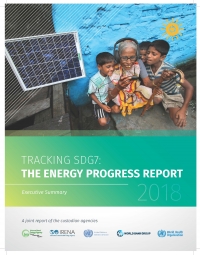World Bank/IEA/IRENA/UN/WHO: Tracking SDG7: The Energy Progress Report 2018 (Executive Summary) - May 2018 - eng (pdf) Избранное
his joint tracking report provides the most comprehensive look available at the world’s progress towards global energy targets on access to electricity, clean cooking, renewable energy and energy efficiency.
Prepared by the Custodian Agencies for Sustainable Development Goal (SDG7), the report gives the international community a global dashboard to register progress on three key targets:
- Ensuring universal energy access;
- Doubling progress on energy efficiency
- Substantially increasing the share of renewable energy by 2030.
It assesses the progress made by each country on these targets and provides a snapshot of how far we are from achieving SDG7. The 2018 release is the fourth edition of the report, formerly known as the Global Tracking Framework (GTF).
Among the findings:
- As of 2015, the world obtained 17.5% of its total final energy consumption from renewable sources, of which 9.6% represents modern forms of renewable energy such as geothermal, hydropower, solar and wind. The remainder is traditional uses of biomass (such as fuelwood and charcoal).
- Based on current policies, the renewable share is expected to reach just 21% by 2030, with modern renewables growing to 15%, falling short of the substantial increase demanded by the SDG7 target.
- Rapidly falling costs have allowed solar and wind to compete with conventional power generation sources in multiple regions, driving the growth in the share of renewables in electricity to 22.8% in 2015. But electricity accounted for only 20% of total final energy consumption that year, highlighting the need to accelerate progress in transport and heating.
- The share of renewable energy in transport is rising quite rapidly, but from a very low base, amounting to only 2.8% in 2015. The use of renewable energy for heating purposes has barely increased in recent years and stood at 24.8% in 2015, of which one third was from modern uses.
- Since 2010, China’s progress in renewable energy alone accounted for nearly 30% of absolute growth in renewable energy consumption globally in 2015. Brazil was the only country among the top 20 largest energy consumers to substantially exceed the global average renewable share in all end uses: electricity, transport and heating. The UK’s share of renewable energy in total final energy consumption grew by 1% annually on average since 2010 – more than five times the global average.
The Custodian Agencies the prepared the Energy Progress Report are: the International Energy Agency (IEA), the International Renewable Energy Agency (IRENA), the United Nations Statistics Division (UNSD), the World Bank, and the World Health Organization (WHO).
Дополнительная информация
- Серия: Международные организации / World Bank
- Год: 2018
- Месяц: 4
- Источник: World Bank


































